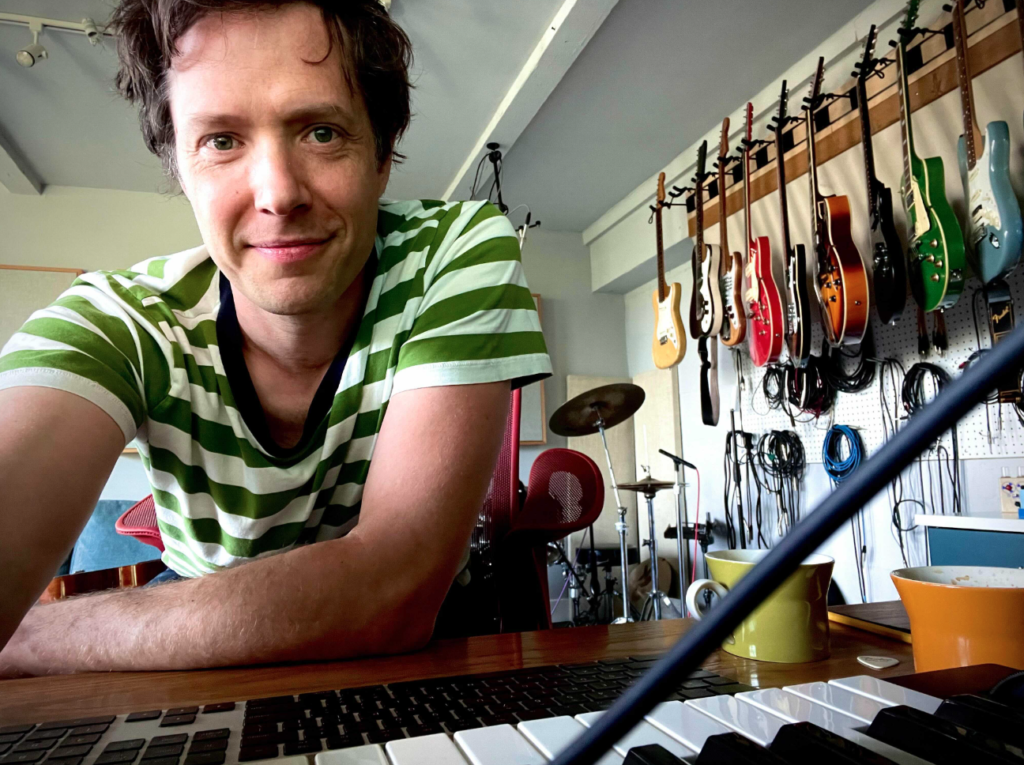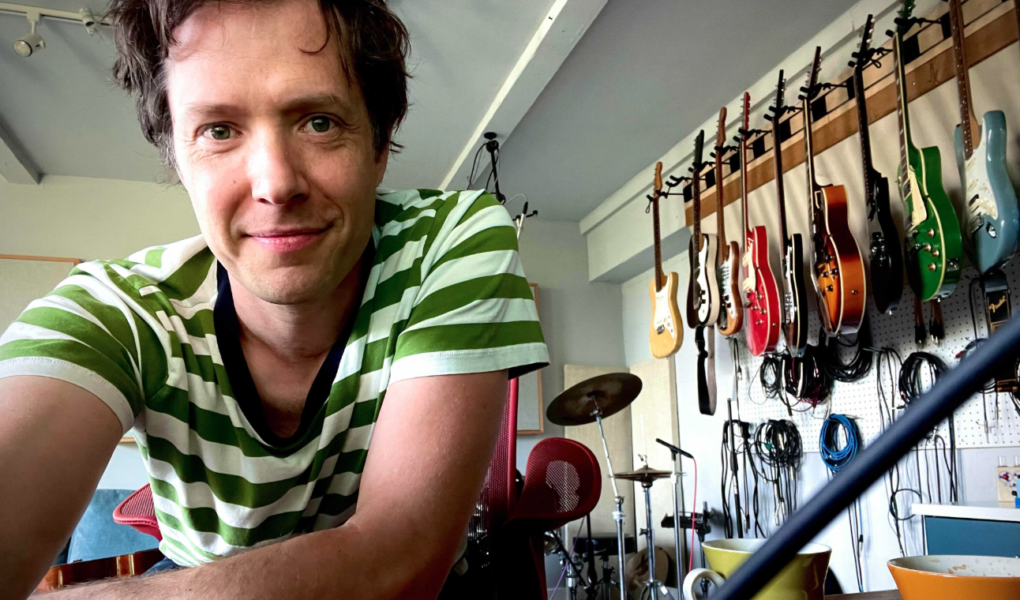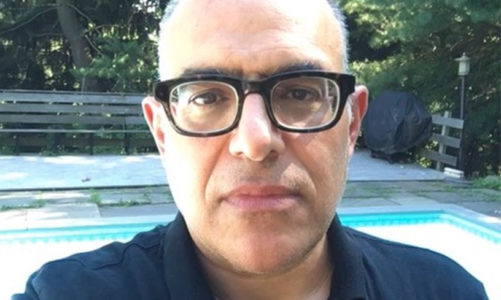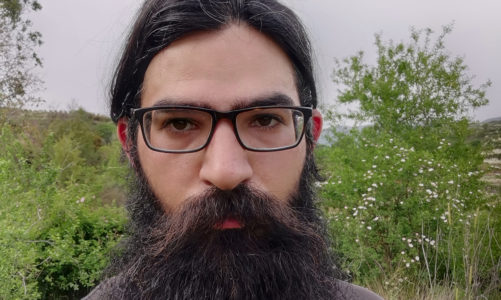
Damian Kulash ’98 is the lead singer and guitarist for the American rock band OK Go. Most famous for their music videos, OK Go has racked up hundreds of millions of views on YouTube. The band has a Grammy award and multiple nominations, won a Los Angeles Film Festival award, received nearly two dozen honors in the Cannes Lions International Festival between 2012-2018, and garnered a fanbase of well over a million monthly listeners on Spotify. Despite their commercial success, the band is especially proud of their popularity among school teachers. Music videos for the band’s songs, such as “This Too Shall Pass” in which the band created a four minute Rube Goldberg machine, require significant math and science to produce and are frequently shown in high school science classrooms across the country. To further this mission, the band recently released the OK Go Sandbox, a website in which students and teachers can navigate a plethora of videos explaining the math and science behind the band’s most famous music videos. Beyond his work with OK Go, Damian has been published in the New York Times, appeared as a guest on The Colbert Report, and testified before Congress.
Evan Stein: OK Go has always been so much more than just a band. From DVDs to music videos to playing songs with marching bands, OK Go has always been a full multimedia experience. When did you decide that you wanted this band to be something so unique?
Damian Kulash: The tools that I have gotten good at and that the band has gotten good at have more to do with our resourcefulness and lateral thinking than they do with mastering any one thing. When we started the band in 1998, the only thing you could really conceive of a band doing as their job was selling records and going on tour. If you were lucky enough to be a band big enough to make music videos, someone else would make them for you. Everything else was considered promotion and was done begrudgingly. For us, all that other stuff was always really fun. We started the band in Chicago, which is where I moved directly after college. Every show we played, we would make these ridiculous silk-screen posters. That actually was a transplant pretty directly from Providence because during the late 90s when I was in school in Providence, the rock scene was so populated by artsy kids from Brown University and RISD that any opportunity to make something was an opportunity to go way overboard. So when I moved to Chicago, it was very natural for me to jump at every art opportunity we could.
The internet is what changed a lot for us. We had the completely accidental success of something of ours going super viral the year before YouTube went online. We had come up with a ridiculous dance routine which we would end our shows with. It was sort of our way of fucking with the “hipster-ness” of the scene at the time. We would play a show and afterwards, anyone who was still shuffling their feet and smoking their cigarettes in the venue would watch us do some ridiculous dance routine. It was sort of the punkist moment of the show because none of the hipsters in the crowd could try to look cool while there’s a band doing an NSYNC type dance on stage. A practice tape of one of those routines went viral and that was when we realized we had accidentally made ourselves a music video. That was a big deal because, at the time, no one knew music videos would transition from MTV to YouTube. That was when we realized music videos could be an art form for us and not just something we were required to do.
Even though everything you just mentioned was something that came so naturally to you guys, you were still doing things that were very unique and defiant to the system in place at the time. That’s very punk.
We had great influences. I grew up in DC where I was a huge fan of the punk scene. When I was a fifteen year old, I started my own record label. In the early 90s in DC, there was a big renaissance of the punk scene. Seattle was having a huge wave with the whole SubPop craze. DC was having its second wave of Dischord Records. Dischord and Fugazi were both huge influences but so was this thing called Simple Machines. It was two women from a band called Tsunami. They created a pamphlet that was a guide to putting out your own records. It was awesome. It showed the three mastering plants in the US and gave their numbers. It had a list of all the record pressing plants that would print at a price kids could afford. I bought that and followed those instructions. None of it was particularly successful. The point is more that the ethos of Ian and Dischord and Simple Machines and Teen Beat and all these great labels was so heavy in DC that it didn’t occur to me there were other ways of doing things.
Punk was so special to me because I could relate to it. Before I could go to punk shows, I was listening to Prince, Run DMC,and early Depeche Mode. These are all artists I loved back then and still love but these weren’t artists I could relate to my existence very much. Prince was virtuosic and synthetic. Run DMC was made up of drum machines,something I didn’t have access to. Depeche Mode was entirely synthetic. With Fugazi, they were just completely regular dudes. They weren’t spectacular guitarists, they were just hitting them really hard. That was the stuff that made me want to make music. Ten years later, I was getting out of college. The guiding lights for me were always pushing me to be resourceful and emotive rather than doing things “the right way.”
As a band who has broken off from a major label in the past and described the current music-scape as a “post major label world,” how do you feel about this new era of music consumption driven by independent artists on TikTok?
I feel both terrified and thrilled. At the beginning of the pandemic, I got to talk with Rebecca Solnit. She is an incredible thinker. She had written a piece for The Guardian about what the pandemic can teach us about hope. She mentioned that, “It feels like setting out into an incredible brewing storm; absolutely terrifying but also thrilling. You’re unmoored from the space you have been stuck but you’re also facing dangers you’ve never had to deal with before. That is sort of what the internet has done to the world of music. There is great freedom that comes with all these challenges to the gatekeepers but there is also selective pressures on creativity that are not great. If you fully democratize the creation of art, it is wonderful and gives everyone a chance but it also becomes very hard to have any professionals in that field.
Think of it like viral videos: The biggest viral videos tend to happen completely by accident. Maybe a sneeze at the perfect time or someone falling off a chair. The problem then becomes that these viral stars are chasing something wondering if they can fall off a chair the same way a second time. It’s very different from developing a set of honed creative skills.
Anyone can now make music and if you want to spend your life getting better and better at that, that’s wonderful but the chances of you making a living off that have gotten smaller and smaller. I hope I’m wrong. There is an article by Steve Albini in the 90s called “The Plight of the Mid-level Musician.” It laid out exactly how little money could be earned by someone who had less than U2 level success. That has been the case forever. There are big forces always working against the little guy who likes to make stuff. Whichever era you’re looking at, there’s a one in a million shot. The only joy you can really guarantee getting out of it is if you really enjoy the work you’re doing.
There’s such a big difference between when the music industry is making money and when the music industry is artistically rich. Those things don’t work in tandem.
That’s the dynamic with everything. There’s a push and pull between innovation and efficiency. There’s always conflict between the strength and power of an industry that can support its artists and one that is being disrupted all the time. Music theory is useful but you eventually need someone to come along and say, “You know what sounds great? Power chords.” They break all the rules but they created rock n roll. You need people breaking the rules. You need both innovation and a machine-like industry at the same time and those two things don’t really go together. They’ll always push and pull.
Our band sort of broke the industry when it came to music videos. The year that our treadmill video won the Grammy, some label executive who I was sitting with leaned over to me and said, “You just killed MTV.” That’s not true but that was the feeling at the time. The whole world changes pretty quickly when you push it a little bit. You also need those structures in place.
So you guys started doing your videos pre-YouTube. How has YouTube’s constantly shifting algorithm affected what you guys do as a band?
I haven’t paid attention. I’m sure the metrics show some shift in viewership but my band’s business model is far less sophisticated than the things you and I are talking about today. We just make stuff and keep making stuff and try not to look down too much. Our band has been together for a little over 20 years and it has been less than half of that that I was able to be rid of the overarching anxiety that it would stop at any given moment. The odds are always against you as a musician. Nobody needs the next song or video you’re making.
Has the way that COVID has made nothing definite changed your view on that at all? Surely if the band can make it through this, what can’t it make it through?
This is the one thing COVID didn’t change for me, personally. I am the father of toddler twins and they were about eighteen months old when COVID struck. When you have a sub-eighteen month old toddler, you don’t really leave the house anyway. COVID didn’t change my habits much at all. It extended the time of which I couldn’t go on tour or work but the music industry has been put on pause anyway. What’s really interesting is what happens now. Obviously shows will be back soon but how much of the music industry is going to rebuild itself around live shows? Has COVID made a permanent change?
Can I give you my theory on this?
Yes. Please do.
Many artists have been writing during the pandemic since that’s all they can do. So many of those artists have had to sit on their music because the music industry’s monetization model made releasing music simply a mode of promoting touring. When shows come back on the horizon, I think we’ll see a lot more music getting released than we ever have seen before. Will the industry screw artists over more and send the balance back towards live music?
I would guess that it will be bad for the artist. There are infinite kids who want to make music for a job. There are not infinite people who want to build the distribution infrastructure. The people controlling the distribution infrastructure can always find someone to take advantage of. They can always replace a musician who asks for too much. The musician has virtually no bargaining power. That’s a shame but it really is a known dynamic within the music industry. It’s not a huge surprise that everytime the door is opened to more artists, more of a share of the revenue goes to the powers that be.
This is a unique interview in that you’re the first person I’ve interviewed that went to Brown. So please, let’s talk about Brown. How’d you like your time here? Any memories or stories that stick out to you when you think about your time at Brown?
I stayed up most nights working at the studio a lot. There was a recording studio in Steinert and I managed to become the person who wrote the weekly schedule for it so I had plenty of time in there.
I loved my time at Brown. It was far and away the best four years of my life until I had kids. What I loved most about Brown was that everyone around me was intelligent, resourceful, and formidable. You’re constantly challenged and inspired there. The lack of requirements provided a feedback loop that encouraged working harder. I was so inspired by the things people were doing around me. I couldn’t just say, “I got an A in this class so I’m good.” It was very much about everything else you were able to do and what you could make of the Brown experience for yourself. I learned from everyone around me. My friends from Brown are still my best friends! I love Brown.
Favorite and least favorite dining halls? Favorite and least favorite dorms you had?
I always thought the Ratty was pretty great. It wasn’t like the food was spectacular but it was totally sufficient for what I needed. I needed to be around other people and to be able to have food at whatever weird hour I wanted it. My freshman dorm was Perkins. I really loved that year. There was no specific place or any activity that Brown provided that made my time there so great. It really was just the community. It was always a thrill and always an inspiration. Every day you saw someone doing something even more interesting than you thought was possible in that domain.
One thing I love about the OK Go Sandbox is the intentional detail put into the tone of the whole thing. With all the videos, there is a very hopeful, encouraging tone that lets the user know that failure is part of the process. How important was failure in OK Go’s career as a whole?
Iteration and exploration are huge parts of our career. I avoid the word failure because it supports the notion that an experiment that turns up with unexpected results is bad. The Rube Goldberg machine for the “This Too Shall Pass” video didn’t get to the end very many times. It only finished three out of eighty-seven times. It failed lots and lots of times but if it worked on the first run, then it clearly wasn’t an ambitious enough machine. The real goal was to make something as precarious as possible that would still work enough times that we could expect to get to the end within a few days.
The process for that video started with twelve engineers. When we first tried everything out, every piece worked perfectly and because of that was not exciting to watch. There’s no marvel in things that are easily repeatable. You’re not designing for functionality but for emotionality. That’s the case across any medium. That wow factor comes from people inherently understanding that the take they see was not the first try. The wow factor comes from seeing that the project took real work and is magical because of it. That is a very very hard thing to communicate in education.
We started OK Go Sandbox because so many teachers reached out to us saying they used our videos in the classroom. We wanted to do more for that community of heroes than just saying thank you. We can’t make music videos any faster than we do but we can maybe give supportive material to what we’re doing. At first, we thought the way to do that was to give them the math we used for each video. The teachers got back to us saying, “We can teach our kids engineering. We can teach them math. What we can’t teach them is the process of trying something over and over again because it doesn’t work the first time.” Sometimes you call it failure. Sometimes you call it iteration but the idea that one shouldn’t lose faith because at first things don’t work is very hard to teach young people.
As someone who has taken their ivy league degree and managed to make it incredibly useful in a field that doesn’t require any knowledge of math and science, what advice can you give to students who feel defined by their degree?
It’s rare for me to take great joy out of something that has already happened in my past. I love prying open a new door more than I enjoy walking through it and definitely more than I enjoy looking back and saying “Wow I can’t believe I walked through that door.” When you get an award, the first question is always “How does it feel to get this award?” It feels good but the thing I’m already thinking about is what I’m going to do tomorrow.
The world needs people who are specialists in very specific scientific fields but it also needs people who know enough about those fields to think laterally and bring to bear some type of information they know from another field. In general, creative thinking is not doing the same thing over and over again. A degree is a tool. You do need the specific knowledge and tools you learn while getting a degree but you also need to be able to use them differently. By the time you have a degree, it becomes obsolete. The fields we work in change so fast that all you really need is a broader sense of how to use your tools and how to keep acquiring new tools. Your degree is one of those tools but your resourcefulness and general intelligence are much much more important.
Thank you so much for doing this interview! Do you have any last words?
I hope that Brown gets Brown-ier again soon.
*This interview has been edited for length and clarity.





Hello! I could have sworn I’ve been to this website before but after checking through some of the post I realized it’s new to me. Nonetheless, I’m definitely glad I found it and I’ll be bookmarking and checking back frequently!